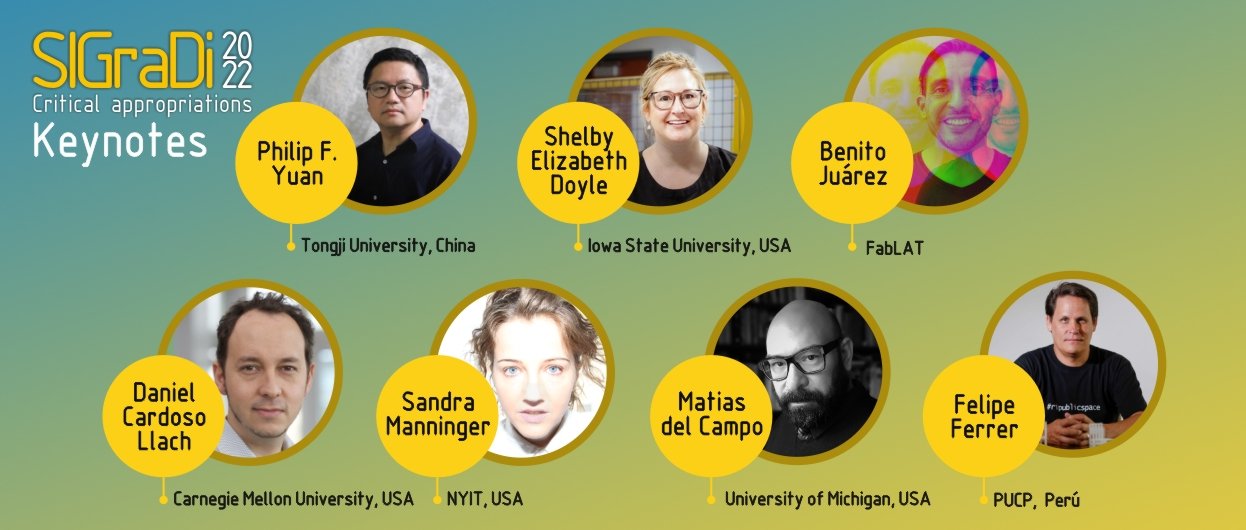Keynote Speakers online EVENT
Online Event: November 9th-11th, 2022

08:30 – 09:45 (GMT -5)
D1.S1.Keynote Speaker (Plenary Room)
Philip F. Yuan, China
Touching Metaverse: How Fabrication Bridges the Virtual and the Real
Alcanzando el metaverso: Cómo la fabricación une lo virtual y lo real
Session Chair: Tomás Vivanco
Pontificia Universidad Católica de Chile, Chile
FREE REGISTRATION LINK
11:30 – 12:45 (GMT -5)
D1.S2.Keynote Speaker (Plenary Room)
Felipe Ferrer, Perú
Aprender Haciendo
Learning by Doing
Session Chair: Rodrigo Martin-Iglesias
Universidad de Buenos Aires, Argentina
FREE REGISTRATION LINK
08:30 – 09:45 (GMT -5)
D2.S1.Keynote Speaker (Plenary Room)
Matias del Campo & Sandra Manninger, USA
Architecture and Artificial Intelligence – Rise of a Paradigm
Arquitectura e Inteligencia Artificial – El surgimiento de un paradigma
Session Chair: Marcelo Bernal
Perkins & Will, USA
FREE REGISTRATION LINK
11:30 – 12:45 (GMT -5)
D2.S2.Keynote Speaker (Plenary Room)
Shelby Elizabeth Doyle, USA
A Carrier Bag of Tools for Computational Feminism
Un maletín de herramientas para el feminismo computacional
Session Chair: Gabriela Celani
Universidade Estadual de Campinas, Brazil
FREE REGISTRATION LINK
08:30 – 09:45 (GMT -5)
D3.S1.Keynote Speaker (Plenary Room)
Daniel Cardoso Llach, USA
Otras Computaciones
Other Computations
Session Chair: Pablo C. Herrera
Universidad Peruana de Ciencias Aplicadas
FREE REGISTRATION LINK
11:30 – 12:45 (GMT -5)
D3.S2.Keynote Speaker (Plenary Room)
Benito Juárez, Perú
Fabricación Regenerativa | Más allá de la 4ta Revolución Industrial
Regenerative Manufacturing | Beyond the 4th Industrial Revolution
Session Chair: David Sperling
Universidade de São Paulo
FREE REGISTRATION LINK
Touching Metaverse: How Fabrication Bridges the Virtual and the Real
Philip F. Yuan is a professor at the College of Architecture and Urban Planning (CAUP) at Tongji University, Thomas Jefferson professor at University of Virginia (UVA, 2019), the visiting professor at Massachusetts Institute of Technology (MIT, 2019) and Royal Melbourne Institute of Technology (RMIT, 2021). He is also the co-founder of DigitalFUTURES and Editor in Chief of Architectural Intelligence journal, the founder of Archi-Union Architects and Fab-Union Technology, council member of UIA Professional Practice Commission (PPC). Yuan is a pioneer in architectural intelligence and robotic fabrication, making achievements in both academic research and architectural practice. He emphasizes the integration of technological innovation and architectural culture, building environment and ethics, constantly seeking human-machine collaboration in the era of post-humanism.
A Carrier Bag of Tools for Computational Feminism
Shelby Elizabeth Doyle, AIA is an Associate Professor of Architecture and Stan G. Thurston Professor of Design Build at the Iowa State University College of Design, co-founder of the ISU Computation & Construction Lab (CCL), and director of the ISU Architectural Robotics Lab (ARL). The central hypothesis of CCL and Doyle’s work is that computation in architecture is a material, pedagogical, and social project; computation is both informed by and productive of architectural cultures. This hypothesis is explored, through the fabrication of built projects and materialized in computational practices. The CCL is invested in questioning the role of education and pedagogy in replicating existing technological inequities, and in pursuing the potential for technology in architecture as a space of and for gender equity. Doyle received a Fulbright Fellowship to Cambodia, a Master of Architecture from the Harvard Graduate School of Design, and a Bachelor of Science in architecture from the University of Virginia.
Otras Computaciones
Daniel Cardoso Llach is Associate Professor of Architecture at Carnegie Mellon University, where he chairs the Master of Science in Computational Design and co-directs CodeLab. He is the author of publications, exhibitions, and artifacts exploring the nexus of design and computation through sociotechnical and historical lenses, including the book Builders of the Vision: Software and the Imagination of Design, and the forthcoming Designing the Computational Image, Imagining Computational Design, with Theodora Vardouli. Cardoso Llach’s work has been supported by the Graham Foundation for Advanced Studies in the Fine Arts, Canada’s Social Science and Humanities Research Council, Google’s Artists + Machine Intelligence program, among others. He is also a 2021-22 Pennsylvania Manufacturing Fellow and founding co-editor of the Design, Technology, and Society Routledge book series. Daniel holds a Ph.D. and a MS (with honors) from MIT, and a B. Arch. from Universidad de los Andes at his native Bogotá.
Regenerative Manufacturing | Beyond the 4th Industrial Revolution
Benito Juarez is pioneer in digital manufacturing technologies in Peru and Latin America. Co-founder of the Latin American Fab Labs Network. Creator of the Floating Fab Amazon project, selected by the United Nations for the global launch of the 17 SDG (NYC, 2015) as “the World’s most disruptive project on Sustainable Manufacturing and Climate Change” (Summit Solutions, UN 2015). Creator of the SimbioCreación methodology, which promotes the culture of Exponential Collaborative Creativity. Co-founder of NUTRIGENE (Singularity University 2016), a company dedicated to eradicating malnutrition in the world through a nutrient printer. Director of Supernodo Latinoamérica (Fab Lat) from where he works for technological democratization through the creation of inclusive projects and avant-garde products based on digital fabrication, revaluing the riches in biodiversity and multiculturalism of Latin America.
Architecture and Artificial Intelligence - Rise of a Paradigm
Dr. Matias del Campo is a registered architect, designer, and educator. He is an Associate Professor at Taubman College of Architecture and Urban Planning, University of Michigan (UoM), director of the AR2IL – The Architecture and Artificial Intelligence Laboratory at UoM, and affiliate faculty member of Michigan Robotics and MIDAS the Michigan Institute of Data Science. Most recently he published the AD Machine Hallucinations – Architecture and Artificial Intelligence with Wiley, and his book Neural Architecture – Design and Artificial Intelligence with ORO editions.
Architecture and Artificial Intelligence - Rise of a Paradigm
Dr. Sandra Manninger is an architect, researcher, and educator. Born and educated in Austria, she co-founded SPAN Architecture together with Matias del Campo in 2003.
SPAN Architecture’s research highlights how to go beyond beautiful data to discover something that could be defined voluptuous data. This coagulation of numbers, algorithms, procedures, and programs uses the forces of thriving nature and, passing through the calculation of multi-core processors, knits them with human desire.
Her award-winning projects have been published and exhibited internationally, e.g., at La Biennale di Venezia 14/16/18/21, MAK, Autodesk Pier 1 and have been included in the permanent collections of the FRAC, Design Museum in Munich, or the Albertina in Vienna.
Sandra Manninger has taught internationally at, e.g., the TU Vienna, University for Applied Arts, DIA Bauhaus in Dessau, UPenn, Tongji and Tsinghua Universities, at the University of Michigan, and the Royal Melbourne Institute of Architecture.
Aprender Haciendo
Felipe Ferrer Cárdenas (Lima, 1978). In 2002 he graduated with an outstanding thesis from the Universidad Peruana de Ciencias Aplicadas (UPC). He is a registered architect and founder of V.Oid. He is a professor at the PUCP Pontificia Universidad Católica del Perú where he has taught courses on Digital Fabrication, Final Degree Projects and Experimental Workshop V on experimental design. He has a master’s degree in Advanced Architectural Design from Columbia University where he was also a professor of the advanced design master’s degree (2005-2006). He worked with Diller Scofidio + Renfro (2005-2010). In Italy they awarded him the Gold A’ Award and he was nominated for the Mies Crown Hall Americas Prize Award in Chicago with the AGP eGlass Factory project in Lima. Felipe was selected as Curator for the Peruvian Pavilion at the Venice Biennale 2020-21 where he resignifies bars in public spaces to turn them into artifacts to interact with. Felipe and Peter Seinfeld, both UPC graduates, edited the book “1:1 Projects on the Territories of Peru” (PUCP, 2019) and which compiles the most significant works of their workshops over eight years of teaching.


